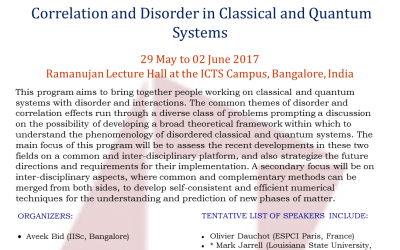This program aims to bring together people working on classical and quantum systems with disorder and interactions. The extensive exploration, through experiments, simulations and model calculations, of growing correlation lengths associated with the rapid increases of viscosity and relaxation times in classical systems is a major recent development in the study of the glass transition. At the same time, there have also been significant advances, recently, in the effort to combine density functional theory with dynamical mean-field theory (DFT+DMFT) to understand the properties of quantum many-body systems. These involve treating interactions using quantum impurity models, thereby connecting directly to the physics of disordered systems. Another interesting recent direction of investigation is understanding how the interplay of interactions and disorder in quantum many-body systems can lead to ergodic and non-ergodic phases and transitions between them. The common themes of disorder and correlation effects run through this diverse class of problems prompting a discussion on the possibility of developing a broad theoretical framework within which to understand the phenomenology of disordered classical and quantum systems. The main focus of this program will be to assess the recent developments in these two fields on a common and inter-disciplinary platform, and also strategize the future directions and requirements for their implementation. A secondary focus will be on inter-disciplinary aspects, where common and complementary methods can be merged from both sides, to develop self-consistent and efficient numerical techniques for the understanding and prediction of new phases of matter.
 This program is partially supported by NanoScience division of Oxford Instruments
This program is partially supported by NanoScience division of Oxford Instruments
 icts
icts res
res in
in

